The Courts and the Constitution hosted by NALSAR University of Law is all set to begin! Courts and Constitution is an annual conference organized by the NALSAR University of Law, Azim Premji University, and the Law and Other Things blog, highlighting recent developments in the field of public law. We have SCC Online as our exclusive Knowledge Partner and SCC Times as Media Partner. Every year, the conference aims to bring together diverse viewpoints on constitutional issues that have a long-term impact on governance and the rights of the citizenry. For anyone who would like to attend the conference, they can join via the following link for all the panels: https://www.youtube.com/live/xcZLogtExIg?si=e7wioXWJFrotLUdz
Inaugural session [ 10:00 – 11:30 AM]
The inaugural session of the 5th Courts and Constitution Conference commenced with Prof. Siddharth Chauhan (Assistant Professor, NALSAR) introducing the premise of the conference. The conference aims to set up an independent forum that hosts diverse viewpoints and critical dialogue about public law. Prof. Chauhan introduced and welcomed the prestigious panelists. The conference brings to light 3 sides to the issue in a panel, an engaged and involved individual, a more detached academic perspective and a critical view.
The Vice Chancellor of NALSAR, Dr. Srikrishna Deva Rao invited the scholars to engage in facilitating a diversity in the views and opinions expressed in the flagship conference. He acknowledged Law and other Things, a prestigious student-led blog active in the organization of the conference. He introduced the judicial contributions of the esteemed guest Justice B.V. Nagarathna (Judge, Supreme Court of India) such as the criminal justice judgements and the landmark case about the best interests of the child and the presumption of its legitimacy in divorce cases.
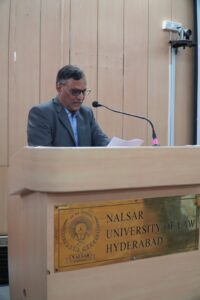
Vice Chancellor Dr. Srikrishna Deva Rao introduces our esteemed dignitaries
Justice Ravindra Bhat noted how courts over the last year have delivered some crucial judgements, including demonetisation, the Maharashtra Assembly case, electoral bonds, the same sex marriage equality case, etc. He opined that examining our constitutional norms enables the judiciary to keep pace with a dynamic society, and where needed to carve new norms and interpretations.
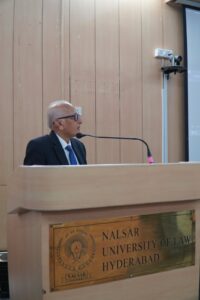
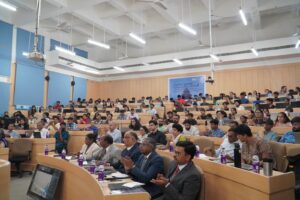
Justice Ravindra Bhat addresses a full house of students, professors and academics
Justice Sapana Pradhan Malla of the Supreme Court of Nepal noted how the conference gave judges like her the ability to interact with legal scholars and students. She noted how the role of judiciary in protecting the constitution is crucial, especially given the various political factions and frictions in society. She further noted that it is not just the ends, but also the means which are important and constitutional values and norms are crucial. Importantly, she cautioned that one cannot ignore the pressures and threats that currently face the judiciary, including political forces, and media trials. She concluded that the strength of democracy lies in the strength of its institutions, including its judiciary.
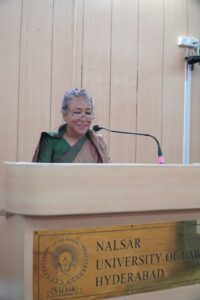
Justice Sapana Pradhan Malla of the Supreme Court of Nepal
Justice Shah of the Pakistan Supreme Court spoke about how comparative constitutional law is of particular importance, since judges often rely on foreign jurisprudence, learning new ideas, interpretative tools and ways of approaching legal tools to enhance judicial reasoning. He examined how this can help enhance international cooperation and promote just outcomes.

Justice Shah of the Pakistan Supreme Court addresses the conference virtually
The keynote address was given by Justice Alok Aradhe, the Chief Justice of the Telangana High Court and the Chancellor of NALSAR. Justice Aradhe noted how the Courts and Constitution provides an important platform for various actors in the legal profession and outlined the topics up for debate in the various panels. He observed the trends in SAARC countries in constitutional law, equality jurisprudence, etc. and how they differ. He concluded by commending the Indian courts on upholding global principles of constitutional law.
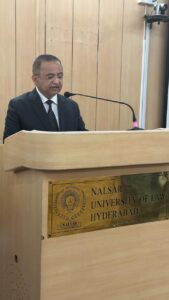
Chancellor of NALSAR Chief Justice Aradhe of the Telangana High Court
In her inaugural address, Justice B.V. Nagarathna reflected on the foundational importance of comparative constitutional law dialogue within the judicial process, particularly in light of the presence of esteemed South Asian judges. Commemorating India’s 75 years of independence and the judiciary’s journey in upholding constitutional principles by establishing 25 constitutional benches, she highlighted significant judgments of the past year. She spoke briefly about judgments notably authored by her and the reasoning she has adopted in pronouncing them, including her dissent in the two demonetization cases over ‘constitutional tort,’ validity of circumstantial evidence in bribery cases analyzed in Neeraj Dutta v. NCT of Delhi, 2023. Notably, she emphasized the significance of dissent, quoting Justice Khanna and how the SC has stood the passage of time in embodying the same while deliberating on key constitutional issues. She further went on to discuss key cases like the path-breaking judgment on Sikkimese women’s exemption from Income Tax, her judgment in the Priyo Indoria case on the scope of transit anticipatory bail, and the Supriyo case on same sex marriage and how different judges of the bench interpreted the issue for and against recognition of civil union. She also emphasized the key judgments pronounced in the past year on the Governor’s role in upholding the constitution, and the reproductive rights case of X vs. the State of Gujarat and how instead of making the debate regarding pro-choice and pro-life, every case, according to Justice Nagarathna should be decided on the basis of factual matrix and what the woman wants and her reasons for the same. She also mentioned the case of Article 370 abrogation and the recent judgment by the SC on surrogacy rights. Stressing the need for reasoned dialogue and adherence to constitutional dictates, she underscored the Supreme Court’s role in serving the people and promoting justice.
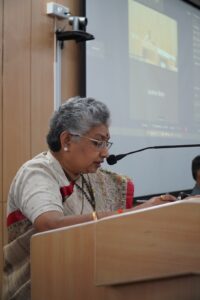
Justice B V Nagarathna, Sitting Judge of the Supreme Court
Prof. Vidyullatha, Registrar at NALSAR gave the vote of thanks and the dignitaries proceeded to interact with the faculty and students. The dignitaries were felicitated by Dr. Srikrishna Deva Rao and then proceeded to view the Preamble exhibit organized by the students. The inaugural session has ended and there are exciting panel discussions to follow.
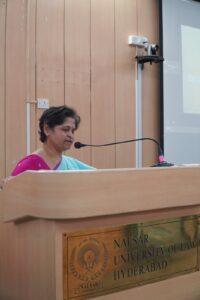
Prof .Vidyullatha proposes the Vote of Thanks
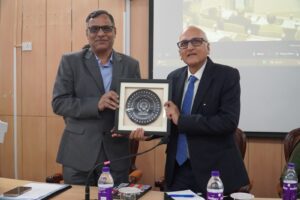
Vice Chancellor of NALSAR felicitates the dignitaries
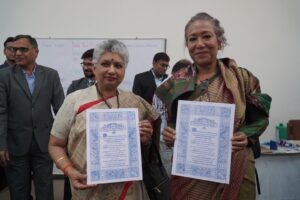
Justices BV Nagarathna and Sapana Pradhan Malla at the Preamble Exhibit
Panel 1 : Electoral Laws and Democratic Legitimacy [12:00-01:30 PM]
The first panel for the 5th Courts and Constitution Conference on ‘Electoral Laws and Democratic Legitimacy’ has begun ! It is being moderated by Prof. Aymen Mohammed (Assistant Professor, NALSAR). The moderator introduced the speakers who would be presenting in the panel. The speakers’ work was highlighted and its contemporary relevance was discussed.
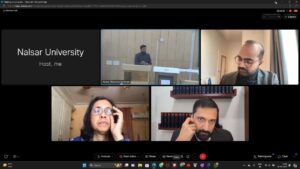
Speaker 1: Dr. Anupama Roy (Professor, JNU) opened the panel as the first speaker. The speaker covered the conceptual anchoring of law in the context of electoral bonds. The speaker discussed literature surrounding electoral laws. The speaker underscored the importance of electoral laws in a free, democratic country. She further noted how the constituent assembly did not see electoral democracy as a problem of design. She further noted how if we look at Article 324, there are two contradictory trajectories. On the one hand, there is an entrenchment and elaboration of Article 324. On the other hand, there is a constraint on Article 324 such as in the appointment of election commissioners in the Anoop Baranwal case. She discussed how the normative concerns of the system, that is, the right to vote and who can stand for elections, can be addressed by exceptional regulation during elections. The professor elaborated on Art 324 and the People’s Representative Act through issues of disqualification of representatives, and the dilution of the franchise itself by the executive.
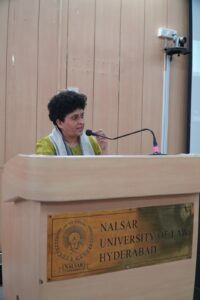
Dr. Anupama Roy opens the discussion on Electoral Laws and Democratic Legitimacy
Speaker 2: Professor Jasmine Joseph (Assistant Professor, NLSIU) served as the second speaker on the panel. The speaker analyzed the right to participate in a democracy and the role of institutions in regulating said participation. The speaker discussed and analyzed different types of Electoral Management Bodies (EMBs) and how international governments fit into each model in the pursuit of achieving electoral integrity. The speaker also raised questions regarding the accountability of EMBs. The speaker agreed with the Supreme Court for the unequivocal need for an independent Election Commission. The speaker deemed the Election Commission Act, 2023 as the antithesis of the Anoop Baranwal judgment. The speaker considered electoral integrity in India to be dependent on fourth-branch institutions capable of securing independent management bodies.
Speaker 3: Aradhya Sethia (Ph.D. Candidate, University of Cambridge) served as the third speaker on the panel. The notable speaker elaborated on the electoral framework through three arguments. Firstly, he elaborated on the classical view of the election system, which is the relationship between the voters and the individual representatives. Elections were based on trust on the individual rather than the ideology or policies. This is one of the reasons that the constitution doesn’t mention political parties outside of disqualification laws. Secondly, the speaker mentioned how recent judgments, especially the Shiv Sena case, recognized the centrality of the political parties in the electoral process other than the individual representative. This has huge implications because the electoral laws are built around the candidate and not the party. Thirdly, the speaker also talked about the party organizations having the authority to discipline legislators; while this is a welcome step, there is a need for regulations on the internal mechanisms of the party organizations as well.
Speaker 4: Adv. Nizam Pasha (Advocate, Supreme Court of India) served as the fourth speaker on the panel. The speaker discussed the case of Azam Khan v. Union of India to highlight the misuse of Section 8 in contemporary times. The speaker agreed with Prof. Joseph (the second speaker on the current panel) in identifying the insecure state of the independence of the Election Commission. Focussing more on anti-defection laws, he presented an overview of some core judgements and developments in this area. He gave valuable first-hand insights into the litigious process of the Shiv Sena judgment before different levels of the court. The speaker also discussed the Shubhash Desai judgment. He concluded with a discussion on the defection of MLAs in the Manipur case and its implications for natural justice.
The session concluded with various questions from the audience to the panelists, on a range of issues such as the role of the CJI in Anoop Baranwal, the procedure of disqualifying members on defection, etc.
The Second panel on Developments in Indian Federalism has just begun!
Panel 2 : Developments in Indian Federalism [02:45-04:15 PM]
Speaker 1 : Mr. Alok Kumar Prasanna (Vidhi Center for Legal Policy) served as the first speaker on this panel. The speaker narrated the story of the Supreme Court, its divergent views, and how it abandoned federalism and democracy in lieu of Article 370. The speaker notes two unique things about India’s federalism— asymmetric federalism, and how federalism in India exists on a spectrum. The speaker covered the two Delhi Cases and how they assert the power of the Lieutenant Governor, and the Article 370 judgment. The speaker opined that the Court never went into the most fundamental issues of federalism and democracy in the 370 case, specifically given that the Constituent Assembly of Jammu and Kashmir was dissolved and any historical understanding of 370 must also consider this aspect in determining whether its provisions were temporary or permanent.
The speaker concluded by posing a provocative question. Will the court apply the same reasoning to the Northeastern States of Nagaland and Mizoram? In contrast, he further questioned whether the court would apply this to states like Madhya Pradesh or Tamil Nadu? Through such questions, the speaker highlighted how the Court, while holding that federalism and democracy as important, only applied this principle for territories that are already integrated into the territory of India. This leaves the territories at the periphery of India that are yet to be integrated as per its understanding vulnerable to similar actions as was seen in the case of Article 370, threatening our federation and democracy.
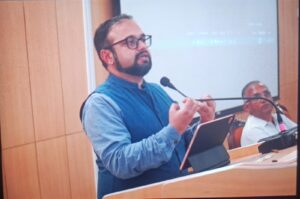
Mr.Alok Prasanna Kumar begins the discussion on Developments in Indian Federalism
Speaker 2 : Advocate Shadan Farasat (Adv. Supreme Court of India) described how federalism is demarcated by the constitution itself and how that demarcation must be upheld by the Supreme Court. The speaker elaborates on central agencies and their exploitation of power in practices. He further shed light on the criticism of CBI, and how the fundamental premise of consent which enables the central agency to investigate in states is being eroded in practice.
He then elaborated on other agencies, including the Election Commission and noted how elections in India may be free (where everyone can vote and participate), but they are certainly not fair (not all actors are on a level playing field). While concluding, the speaker highlights how the majority of contentious constitutional law cases are handled only by the SC, and the high courts have stopped dealing with the same. This is a contributing factor in the erosion of federalism since HCs are as important as SC in maintaining the demarcation of power between state and center.
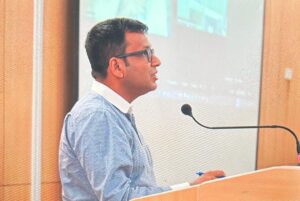
Advocate Shadan Farasat
Speaker 3 : Dr. Sudhir Krishnaswamy (Vice-Chancellor, NLSIU) served as the third speaker on the panel. The speaker, through his keynote, aimed to build a map of the year past and how the jurisprudence developed will affect the ideal of federalism in the future. Unlike our previous understanding of federalism, the speaker opined that Article 356 is no longer the sole factor shaping federalism today. He began by reviewing the cases concerning transition of a Union Territory into a State. For this, the speaker took the examples of Puducherry case and Delhi. The speaker distinguished Article 239AA, that deals with Delhi from Article 239A for Puducherry by focusing on the former article’s diarchic model which was chosen, as per him, because of Delhi’s status as the capital of India. On the other hand, the constitutional question with regard to the special provision for Puducherry is much narrower in scope.
The speaker then pointed out that the conversion of Jammu & Kashmir from a State into a Union Territory is a unique case. This is because a conversion of a state into a union territory has been done for the first time, and it was assumed until now that such a conversion is not constitutionally possible given the understanding that Union Territories were understood as transitionary states, which would eventually become states. The converse, of a state being converted into a Union Territory was never imagined as possible. However, he explained, that the Supreme Court did not engage with the issue and treated it as a trivial matter. Importantly, he points out that if states are allowed to be converted into Union Territories, it would lead to a breakdown of the federal scheme.
The speaker then focused on the role of a governor in the federal scheme and Article 200 of the Constitution. He spoke about the current issue of not granting of assent to legislative bills. The speaker touched upon the nuance of executive federalism and the current problems it poses. He further elaborated on how our understanding of taxing power has substantively changed, particularly after the 15th Finance Commission and the GST system of taxation. The speaker concluded by stating that federalism in contemporary times has taken a constitutionalist tone. The sustenance and success of the Constitution itself will depend upon the survival of federalism, with the latter acting as a bulwark protecting constitutionalism and democracy.

Dr.Sudhir Krishnaswamy joins us virtually
Speaker 4 : Snighdha Singh (assistant professor, Christ University) elaborated on the impact of the removal of art 370. The speaker began by briefly summarizing the developments around the removal and the subsequent case. While Article 3 has always been anti-federal in structure, it was never anti-federal in spirit because no other government had used its powers so unilaterally to alter the very statehood of a territory. She noted how it was until recently, generally used to satisfy political demands from the state. In this regard, the speaker criticized the Supreme Court’s judgment on this issue. It has given the central government to destroy the autonomy of any state with the use of Article 3. She further looked at the scholarly literature on whether the Constituent assembly can be replaced by the parliament.The speaker concluded by remarking that the Supreme Court is not only the guardian of the constitution but the court of last resort and the judgment in this regard is a great concern and has a heavy bearing on the constitutional principle of federalism
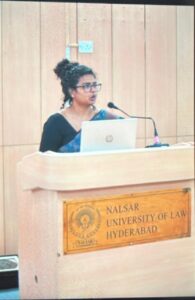
Prof. Snigdha Singh discusses In re Article 370
We are now beginning with our third and last panel for the day, Adjudication of Socio- Economic Rights in SAARC Countries!
Panel 3 : Adjudication of Socio-Economic Rights [04:45-06:15 PM]
Speaker 1 : Justice Syed Mansoor Ali Shah of the Pakistan Supreme Court highlighted the jurisprudence that has emerged from Pakistan, particularly focusing on the interpretation of human rights. He emphasized that the Pakistani constitutional court does not distinguish between socio-economic and political rights, but rather views them as interconnected human rights issues.
He noted that there are co-relations between fundamental rights and socio-economic rights, explaining that rights such as the right to dignity, voting and minority rights are essential to further social justice. He examined that principles underlying such rights, i.e., inclusivity, morality and equal treatment are core aspects of the law.
He further discussed issues surrounding gender justice, noting that despite constituting half the demography of states, women are not adequately represented in the judiciary. However, he noted some critical developments in gender jurisprudence such as holding the two finger test for sexual assault victims as unconstitutional for violating the right to bodily autonomy and privacy of women. He further mentioned that the ambit of offences of sexual harassment should not be limited to a particular gender but shall be inclusive of all genders including transgenders. He also noted how the usage of specific terms like “mentally retarded” or “handicapped” have been prohibited and removed from statute books by the Supreme Courts, a point that Dr. Vasanthi, who moderated the session also pointed out that such developments has been an aspect of Indian jurisprudence as well.
He concluded by examining issues surrounding climate justice, specifically since Pakistan despite not being a heavy emitter does face significant threats from climate justice such as heavy flooding. He noted how water and food justice were proactively addressed by the judiciary. He further noted how climate change adaptation, such as multi-sectoral adaptation was key to tackle such issues.
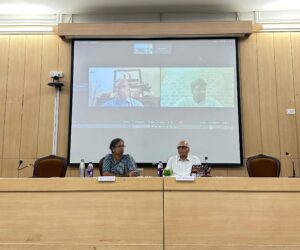
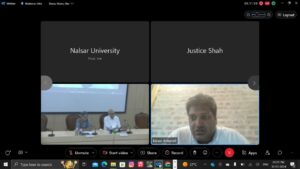
Justice Syed Mansoor Ali Shah and Attorney At Law Mr. Niran Anketell join us online
Speaker 2 : Attorney At Law Mr. Niran Anketell an Attorney at Law from Colombo, Sri Lanka, provided a critical perspective on the justiciability of socio-economic rights in South Asian countries, particularly focusing on Sri Lanka’s context. He expressed skepticism about the effectiveness of making these rights justiciable, arguing that it could lead to judicial overreach and a shift away from the concept of deference to the executive branch.
Mr. Anketell highlighted instances where Sri Lankan courts have taken an interest in environmental preservation, allocating specific days of the week to address issues like land mining and garbage disposal. However, he noted a change in the court’s approach to public issues, particularly in the aftermath of economic crises. Despite attempts by the judiciary to address socio-economic issues, he acknowledged little success in terms of overall social and economic development.
The main challenges facing Sri Lanka include ethnic conflict in the North-East and issues related to the executive’s powers and the electoral system. Mr. Anketell expressed doubts about the inclusion of socio-economic rights in the constitution, citing examples from other countries, particularly in Latin America, where such rights have not yielded desired outcomes. He emphasized that the types of people who have access to courts and legal representation may skew the benefits of these rights towards big corporations rather than marginalized communities. Furthermore, Mr. Anketell suggested that future constitutional reforms should carefully consider the balance of powers between different branches of government to avoid repeating past mistakes.
Speaker 3 : Justice Ravindra Bhat, a former Judge of the Supreme Court of India, provided insights into the evolution of socio-economic rights jurisprudence in South Asian countries, particularly focusing on the role of the judiciary in interpreting and enforcing these rights. He began by acknowledging the diverse viewpoints presented by speakers from Pakistan and Sri Lanka and emphasized that despite significant progress in enforcing socio-economic rights, one needs to address certain undone aspects of socio-economic rights.
Justice Bhat highlighted the historical context of socio-economic rights adjudication, noting that earlier distinctions between fundamental rights and other rights have evolved over time. He shared his experience from his early years of legal practice, where courts adopted a benevolent construction approach. However, he observed that there has been a shift in the jurisprudence post-1990s, with the destruction of unions and changing dynamics in labor and employment law. The presentation particularly delved into the challenges of actualizing socio-economic rights, particularly in urban and rural areas.
Subsequently, Justice Bhat referenced recent Supreme Court decisions, including those where international judgments were considered, signaling a broader approach to restorative justice. He emphasized the significance of progressive realization of social justice, especially amidst rising security concerns and climate change.
Comparative constitutional law, according to Justice Bhat, plays a crucial role in analyzing socio-economic rights, keeping in mind state capacity and constitutional aspirations. He discussed the enabling legal framework and highlighted landmark judgments in South Africa, which delineated the judiciary’s limited role in socio-economic rights enforcement. The presentation underscored the importance of aspirational rights like the right to livelihood and a clean environment, alongside the enforcement of civil and political rights. Justice Bhat cited cases such as Vishaka and PUCL judgments on the right to food, which exemplify the judiciary’s innovative interpretations and its ability to create enforceable rights.
Furthermore, Justice Bhat discussed the judiciary’s role in addressing issues like bonded labor through creative interpretations of statute law and the establishment of benchmarks for socio-economic rights realization. He emphasized the judiciary’s capacity to create space for marginalized issues and to devise mechanisms for their enforcement, thereby contributing to the broader socio-economic rights agenda.
Day 1 of Courts and Constitution 2024 has concluded! The Organising Committee would like to thank all the dignitaries, faculty and students for contributing to the Conference’s success. We look forward to having a robust discussion tomorrow as well.
The schedule for tomorrow March 31, 2024 (Sunday) is as follows;
Panel 4: TAKING STOCK OF THE JUDICIARY (10 am to 11.30 am)
Mr. Nicholas Robinson (Independent Scholar)
Ms. Chitrakshi Jain (TrustBridge, Rule of Law Foundation)
Mr. Saurav Das (Independent Journalist)
Mr. Rahul Bajaj (Attorney, Ira Law & Founder, Mission Accessibility)
Moderator: Mr. Siddharth Raja (Vertices Partners)
Panel 5: DEVELOPMENTS IN EQUALITY JURISPRUDENCE (12 pm to 1.30 pm)
Justice Sapana Pradhan Malla (Judge, Supreme Court of Nepal)
Dr. Saumya Saxena (Associate Professor, JGLS)
Mr. Arvind Narrain (Independent Researcher)
Mr. Supriyo Chakraborty & Mr. Abhay Dang (Petitioners in the Marriage Equality Litigation)
Moderator: Dr. Srijan Sandip Mandal (NALSAR)
Panel 6: SHAMNAD BASHEER MEMORIAL ROUNDTABLE – DISABILITY AND LAW (2.30 pm to 4 pm)
Mr. Yugal Jain (Senior Associate, Shardul Amarchand Mangaldas)
Mr. Anoop Kumar (In-House Counsel, HCL Technologies)
Mr. Yash Dodani (5th year B.A,LL.B. NALSAR)
Prof. Shilpaa Anand (Associate Professor, BITS-Pilani Hyderabad Campus)
Moderator: Dr. Amita Dhanda (NALSAR)
Closing Session (4 pm to 5 pm)
Book Discussion by Arvind Narrain and Sitharamam Kakarala, based on the recently published volume: ‘Of Law and Life: Upendra Baxi in Conversation With Arvind Narrain, Lawrence Liang, Sitharamam Kakarala and Sruti Chaganti (Orient Blackswan, 2024)
Valedictory Remarks – Justice S. Ravindra Bhat (Former Judge, Supreme Court of India)
Plans for Future Editions – Mr. Sidharth Chauhan, Dr. Srijan Sandip Mandal and Mr. Aymen Mohammed (NALSAR)
Vote of Thanks – ‘Law And Other Things’ Editorial Team
Day 2 of Courts and Constitution 2024 has begun! Requesting those interested to join us on this link virtually; https://www.youtube.com/watch?v=C7y6uQoY02k
The first panel for the day is ‘ Taking Stock of the Judiciary’
Panel 4 : Taking Stock of the Judiciary [10:00-11:30 AM]
Speaker 1 : Mr. Saurav Das, an independent journalist, presented an in-depth analysis of various issues plaguing the Indian judiciary, with a particular focus on the concept of the “Master of the Roster” and the lack of transparency in the allocation of cases. He highlighted how decisions regarding the creation of benches and the assignment of cases, traditionally vested in the Master of the Roster, have often been criticized as examples of favoritism within the bench or, at worst, as instances of fixing cases in favor of privileged litigants. Das emphasized the importance of transparency in the constitution of benches, citing concerns raised by judges, including former judges, about the lack of transparency in the process.
One of the key points raised in Das’s presentation was the issue of cases being transferred between judges without reason, leading to questions about the fairness of the process. He provided examples, such as the Umar Khalid case, to illustrate how cases can be transferred from senior judges to junior judges, contrary to established rules. Das highlighted instances where cases being actively heard by a judge were transferred without explanation, leading to concerns about the dispensation of justice. He also touched on a recent controversy on this issue regarding withdrawal of Bail petition by Arvind Kerijiwal in light of his arrest by ED, and how this case as well marks a vote of no confidence in dispensing justice and undermines public confidence in and trust of non-partisanship by the judiciary.
Moreover, Das discussed the lack of mechanisms to address corruption complaints against judges and the challenges faced by journalists in reporting on judicial matters. He emphasized the role of the media as a watchdog in holding the judiciary accountable and criticized the failure of the legal fraternity to uphold judicial standards.
Additionally, Das touched upon the lack of transparency in the judiciary’s functioning, including the lack of clarity regarding the types of cases being heard and on what basis the cases are being marked to be ‘politically sensitive’. He also highlighted concerns about forum shopping by litigants and the need for greater accountability within the judiciary. Das’s presentation provided a comprehensive overview of the challenges facing the Indian judiciary, particularly regarding transparency, accountability, and efficiency. He underscored the urgent need for reforms to address these issues and restore public trust in the judicial system.
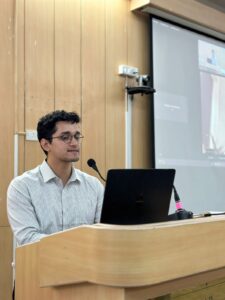
Mr. Saurav Das kickstarts the discussion
Speaker 2 : Mr. Nicholas Robinson, an independent scholar, delivered a presentation focusing on the structuring and functioning of constitutional benches within the Indian Supreme Court (SC). He underscored the need to understand how the Supreme Court’s institutional practices influence its judgments. He further reflected upon the dearth of legislative documents for the judicial processes in India. This makes the processes largely based on the discretion of the Judges.
The presentation delved into constitutional provisions such as Article 143(3), Article 133, and Article 228, which govern the establishment and functioning of constitutional benches. Robinson quoted Dr. Ambedkar and referred to judicial decisions like TM Krishnam Pillai and Raja Ganga Pratap Singh v. Allahabad Bank to underscore the significance of constitutional benches and the discretion exercised by judges in deciding whether a case will be heard by a constitutional bench.
Lastly, he outlined several reasons why the number of constitutional benches should be increased, including the reduced implications of bias, enhanced consistency in judgments, improved quality, legitimacy, optimal utilization of judicial resources, promotion of judicial innovation, and the broader impact on the rest of the judiciary.
In terms of reform strategies, Robinson proposed substantive criteria for cases that should always be heard by constitutional benches, such as those involving the basic structure doctrine or constitutional challenges. He advocated for the establishment of a permanent constitutional bench and suggested that it should decide which bench hears constitutional cases, thus creating a more systematic approach. Additionally, Robinson proposed giving high courts a greater role in handling constitutional cases.
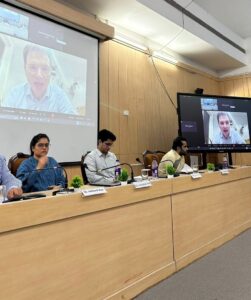
Mr. Nicholas Robinson joins us virtually
Speaker 3 : Ms. Chitrakshi Jain, representing TrustBridge and the Rule of Law Foundation, addressed the contentious issue surrounding the determination of the strength of the judiciary at the district level. She further discussed the fiscal implications of courts issuing orders due to their lack of expertise on budget allocation, and the expansion of administrative powers exercised by Courts in establishing commissions. This was primarily centered around the power tussle between the Supreme Court and the State Government.
One major concern highlighted by Jain was the lack of adequate service conditions for the district judiciary due to inadequate infrastructure. This issue led to the establishment of a commission by the SC, which subsequently issued an order for the same. However, this order faced legal challenges from the Union and state governments, contesting the judiciary’s authority to determine fiscal matters, citing Article 235 and 109.
Jain also discussed the litigation surrounding the court judge strength formula developed by an interim committee, which was to be implemented by state governments. The formula for calculating judge strength is crucial, as it impacts various aspects of budget preparation controlled by the High Courts. However, there seems to be a lack of uniformity in implementing the formula. Notably, some High Courts are unaware of the Supreme Court’s standards and continue to use outdated methods based on population strength.
In conclusion, Jain emphasized the role of the SC’s E-Committee and the involvement of state governments in addressing fiscal challenges facing the judiciary, particularly at the district level. She cautioned against the unwarranted expansion of administrative powers of the SC and stressed the importance of addressing these issues to ensure the effective functioning of the judiciary.
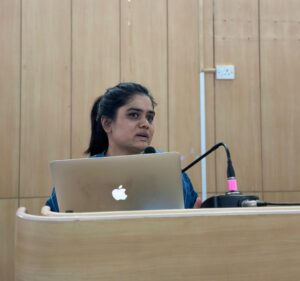
Ms. Chitrakshi Jain
Speaker 4 : Mr. Rahul Bajaj (Attorney, Ira Law & Founder, Mission Accessibility) primarily addressed concerns of accessibility in his speech.
He firstly looked at the need for Indian courts to become more accessible for persons with disabilities. The speaker emphasized that persons with disabilities have the right to access to justice under the Rights of Persons with Disabilities Act, 2016. He noted that there was a need for reform in this regard such as appropriate OCR equipment, sign language interpretations, etc. The speaker further elaborated on some positive developments that have taken place in this regard. The Supreme Court’s E-Committee’s guidelines to the High Courts have resulted in some progressive changes such as moderating the captcha system in digital interface. There have also been developments in accessibility to PDFs and the cause list. The speaker also elaborated on the eight Principles evolved by the SC accessibility committee to further reform in this area.
However, he also presented suggestions for reforms, including physical infrastructural reforms necessary for persons with disabilities such as better ramps, hydraulic lifts, etc. He noted that sign language interpretation systems must be developed by the SC, both when a person is either arguing or part of the court proceedings, as well as for important matters. The speaker also emphasized the need for having an equal opportunity policy for PWDs. While SC’s recommendations were sound on paper, the gap in implementing such reforms needs to be bridged. The speakers also emphasized the need to address social justice matters in a time bound manner. Such matters must be prioritized and a practical mechanism needs to be evolved on an institutional basis.
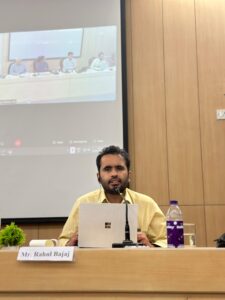
Mr. Rahul Bajaj
Panel 5: Developments in Equality Jurisprudence [12: 15 – 01: 45 PM)
Speaker 1 : Justice Malla addressed discrimination by highlighting specific cases in Nepal’s legal system, such as the lenient punishment for sexual assault against a sex worker, and the acquittal of an individual accused of gang-rape due to inconsistencies in the victim’s statements. She emphasized the importance of understanding discrimination in all its forms, including marital rape and property rights issues. Justice Malla advocated for challenging laws perpetuating gender biases and discrimination, particularly regarding sexual minorities’ rights and marriage recognition. She stressed the need for ongoing research, action, and legal challenges to combat discrimination, noting that while it is a tough journey, requiring one to confront deeply ingrained societal norms and structures such as the patriarchy, it is a necessary one.
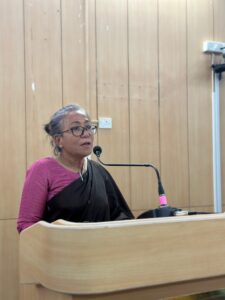
Justice Malla discusses the importance of PILs in furthering gender justice
Speakers 2 and 3 : Mr. Supriyo Chakraborty and Mr. Abhay Dang, the lead petitioners in the landmark case of Supriyo @ Supriya Chakraborty vs Union Of India on 17 October 2023, presented their perspective on challenging the constitutionality of Section 4(c) of the Special Marriage Act. They shared their personal experiences as a queer couple and highlighted the legal challenges and discrimination they faced due to the lack of recognition of their marriage.
Even though they were able to marry, they never had a legal recognition granted to that marriage. Explaining what that looks like, Supriyo noted how explaining that relationship to anyone, friends, family, or third parties, one cannot help but address their relationships as friends. Abhay elaborated on the practical implications of the legal discrimination they faced, such as the inability to sign for each other in case of incapacitation. He shared his experience of having to get two insurance policies with different nominees, which makes the process of claiming insurance much harder since the person closest and most proximate to you cannot sign off on the insurance on your behalf. Even something deemed as simple as getting an address registered was made much harder, since the process of getting your partner’s address registered in the same house became more complex when they aren’t recognized in any of the current legal categories such as a spouse.
Abhay also discusses their experience with the same-sex marriage verdict. He noted that while a right to marriage might not be explicitly enumerated in the Constitution, there is still the right of equality which must be preserved. He concluded by noting that even as they might have lost the battle in courts, they still contributed to meaningful conversations and societal changes on this subject.
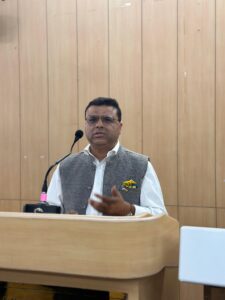
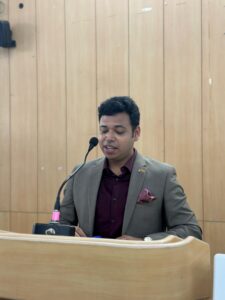
Mr. Supriyo Chakraborty and Mr. Abhay Dang
Speaker 4 : Mr. Arvind Narrain, an independent researcher and visiting faculty at NLSIU in his analysis of the landmark case of Supriyo @ Supriya Chakraborty vs Union Of India, 2023,provided a critical assessment of the judgment’s legal implications and its broader societal significance. Mr. Narrain emphasized the importance of recognizing the diverse stories and identities of individuals involved in legal proceedings, highlighting the significant number of petitioners (91) in the case, which he argued demonstrated that the issue of recognition of queer marriage is not limited to an elite few but affects people from all walks of life.
He noted that one positive aspect of the judgment was upholding the principles established in the Navtej Johar case, which advanced LGBTQ+ rights jurisprudence. However, Mr. Narrain raised concerns about the judgment’s conclusion that the right to marriage is not a fundamental right, describing it as problematic. Additionally, Mr. Narrain discussed the court’s decision regarding the Special Marriage Act, acknowledging that while it may not be within the judiciary’s purview to engage in law-making, the act’s discriminatory nature must be addressed. He also highlighted the lack of unanimity among the judges regarding the recognition of civil unions, with Chief Justice Chandrachud suggesting the formation of a committee to address the issue.
Furthermore, Mr. Narrain addressed the question of adoption rights, arguing that such rights should not be restricted to married couples. With reference to Justice Bhat’s decision, he criticized the judgment for recognizing a right without providing a remedy, questioning the practical implications of recognizing the difficulties of the LGBTQ community without ensuring effective access to any remedy, a point which was also highlighted in Justice Chandrachud’s decision. Mr. Arvind Narrain’s analysis provided valuable insights into the legal complexities and societal implications of the Supriyo Chakraborty case, highlighting both its advancements in LGBTQ+ rights jurisprudence and the challenges and limitations inherent in the judgment’s conclusions and remedies.
Speaker 5 : Saumya Saxena, an Associate Professor at Jindal Global Law School, began by presenting an overview of the discussions, noting how marriage equality is an instance where one seeks state intervention but the state does not intervene. On the other hand, personal laws and UCC represent an area where the state intervention itself is prejudicial to the interests of individuals.
Over the course of her discussion, she presented three primary critiques— concerning jurisprudence on Muslim personal law, live-in relationships, and gender justice.
She noted the evolution in this area, examining how the practice of nikah halala is rarely practiced, with court decisions at time also treating it as rape. Similarly, sati has also been banned and made illegal. She further discussed how there has been more acceptance of the differences in tribal communities, with various exceptions granted under the 6th Schedule, the same is not true for religious differences where there is more active state intervention.
On the issue of gender, she noted how an influential argument in favor of the Uniform Civil Code was to further the cause of gender equality. However, she argued that such a code actually achieves the opposite. Taking the example of Uttarakhand, she observed how the procedure for marriages and divorce has been diluted, for instance by doing away with the 30 day notice.
On the question of live-in relationships, she notes how this is viewed as immoral, and uses decisions from the Gujarat High Court asking for parental consent for any marriage of love as an example of such a view towards live-in relationships. She observed that while the state asks live-in relationships to be registered and recognized, and “own” the relationship, the brunt of such recognition often falls on women who the state does not adequately protect. She concluded her stance by stating that the Uttarakhand UCC is not a step in the right direction and reinforces several stereotypes.
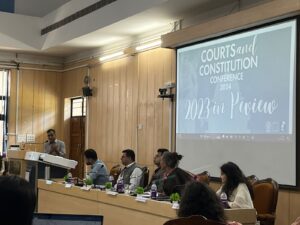
Mr Arvind Narrain addressing the Conference
Our next panel, Session 6 on Shamnad Basheer Memorial Roundtable – Disability and Law has begun!
About this session;
Apart from being a globally acclaimed IPR expert, professor Shamnad Basheer was a social justice warrior who devoted his life to making the legal profession more accessible. He founded ‘Increasing Diversity by Increasing Access’ (IDIA) in 2010 which aimed towards making legal education more accessible for the underprivileged and marginalised groups of society. With the organisation approaching its 15th anniversary, this panel is an ode to Professor Shamnad Basheer and the impact that his work has made on the lives of countless people.
IDIA runs with the help of volunteers which includes 600-plus members from various National Law Universities. Not only has IDIA assisted more than 200 plus scholars to succeed in the entrance exams, but has also guided them in pursuing their legal education through scholarships. IDIA through the years has also worked towards sensitising people regarding careers in law and has been able to sensitise more than 71,000 students. Given the fact that multiple IDIA scholars are located in remote areas, where most chapters are unable to reach them, there is now a growing need for more institutions to furtherthe cause. A key reason forthis is that there can be a much more efficient dissemination of services, leading to a larger number of scholars who can be assisted, thus contributing towards fulfilling the goal of truly increasing diversity within the legal sector.
This panel aims to blend the experience of IDIA scholars with the judicial and academic perspectives of increasing accessibility within legal education and the judicial system in India. The panelists will consist of IDIA scholars who have achieved eminence as practitioners and scholars of law, sharing their insights about their journey and how they overcame personal and professional challenges. The Panel is organized in collaboration with the Hyderabad Chapter of IDIA, based in NALSAR University of Law.
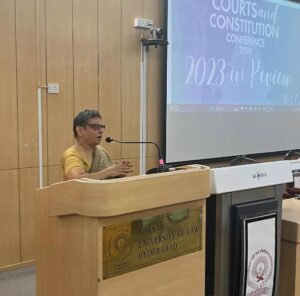
Professor Amita Dhanda moderates the panel discussion
Panel 6: Shamnad Basheer Memorial Roundtable – Disability and Law [02: 45 – 04: 15 PM]
Speaker 1 : Mr. Yugal Jain, a Senior Associate at Shardul Amarchand Mangaldas and an alumnus of NALSAR, reflected on his return to campus and the divide he witnessed among the audience as he discussed the realities of life after law school, particularly for individuals with disabilities. He shared his personal journey of overcoming visual impairment, losing vision in one eye but preserving 20% in the other, and the challenges he faced in an environment marked by pity. In this context, he explained the difference between sympathy and empathy, and pity and compassion. Despite this pity-marked atmosphere, he chose to power through, refusing to acknowledge his disability and even opting to live in a hostel. He emphasized the importance of not letting fear and shame dominate one’s life, highlighting the compassion and empathy he experienced from individuals like Shamnad sir. He praised initiatives like IDIA for sensitizing people and fostering inclusive conversations, acknowledging the impact of volunteers in making connections and promoting understanding and acceptance.
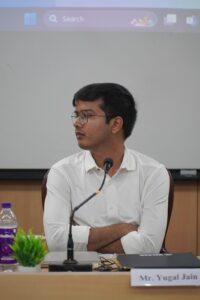
Mr. Yugal Jain, a Senior Associate at Shardul Amarchand Mangaldas
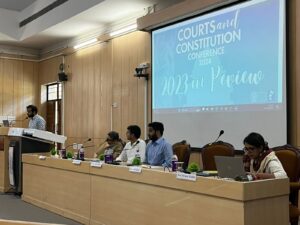 Panelists discuss lived realities and its intersection with the law
Panelists discuss lived realities and its intersection with the law
Speaker 2 : Yash Dodani, a student at NALSAR University of Law, began by discussing his upbringing, challenges he faced, and his path to NALSAR. He noted how the experience of attending a law school and a university campus, away from the support systems of family, was initially challenging. It meant having to adjust to different ways of taking notes, studying, and being on campus due to one’s disability. In this context, he noted how the Increasing Diversity by Increasing Access assisted in establishing the Accessibility Lab at NALSAR to ensure that no one is faced with such problems.
Yash also discussed his journey with facing discrimination at law firms, where even the most recognized corporate law firms don’t always welcome PwD applications, and when they do, it’s not usually in a welcoming setting. Rejections can occur in different contexts, such as interviews. He noted how he faced discrimination when working at firms and even on reporting the same to HR, the burden was shifted on him, accusing him of not disclosing his disability (despite doing so during the application process).
Yash analyzed that the primary reason for firms not accepting PwD students is due to the costs associated with having accommodative space and the subsequent litigation or reputational risks if law firms are found to not do so. However, Yash also noted that people with disabilities are naturally good at solving problems because, in his opinion, they must negotiate a world that is not designed with them in mind at practically every turn. He also drew attention to Vikas Kumar v. UPSC, which overturned an earlier finding and said that modern technology enables people to apply for and be chosen for public positions.
More than anything else, in his opinion, disability compels us to recognize the injustices and inconsistencies in life and makes more room for reflections within ourselves.
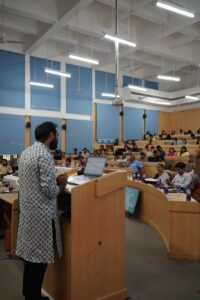
NALSAR’s own Yash Dodani addresses the house on law school experience
Speaker 3 : Mr. Anoop Kumar, an In-House Counsel at HCL Technologies shared his perspective on some positive aspects of being blind, emphasizing the impact of initiatives like IDIA and the need for broader inclusivity across society. He considered himself a living example of Shamnad Basheer’s vision and highlighted the scale of operation required to reach the millions of people with disabilities in India, citing the 2011 census data. Anoop stressed the importance of extending IDIA’s efforts beyond law and including other fields, while questioning the actions taken by the law and legislature to ensure access and inclusivity. He highlighted the lack of compliance reports from NLUs on building accommodative spaces and underscored the need for individuals and institutions to embrace reasonable accommodation. Anoop emphasized the role of persuasion in classrooms and workplaces, reflecting on employment statistics and the need for continuous support and a shift in societal attitudes towards people with disabilities, beyond just relying on litigation and court rulings.
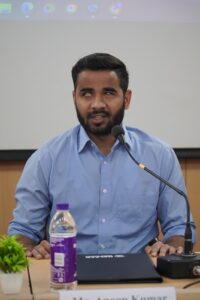
Mr Anoop Kumar
Speaker 4 : Professor Shilpaa Anand from BITS-Pilani Hyderabad Campus emphasized that when discussing disability, the expertise of people with disabilities over medical practitioners. She highlighted how disability experiences vary based on socio-economic factors, stressing the importance of considering these when understanding disability studies. The clash between the medical and social models, exemplified by the Vikas Kumar judgment, underscores the need to recognize emotional and social aspects of disability. She noted how there continue to remain challenges such as reasonable accommodation and lack of tactile pathways for persons with disabilities, as well as the over-medicalization of certain impairments and creating stigma and barriers to progress. She questions what reasonable accommodations can be demanded and calls for disciplines to reorganize themselves to better support disabled individuals. Importantly, improvements in pedagogical resources are crucial, reflecting on the need to critically reflect on accessibility initiatives and challenge mainstream expectations imposed on disabled individuals, particularly in assessment techniques and education systems.
She concludes by noting that considering accessibility issues and working on projects related to them enables us to critically consider what merit is. She argued that forcing the disabled people to sit for mainstream competitive tests and answer evaluation techniques in a way that the techniques want them to respond are weak and are in dire need of reform.
Professor Dr. Amita Dhanda, from NALSAR, moderated the panel discussion on the challenges and strategies for fostering inclusion of disabled individuals. She emphasized the need for diversifying teaching methods to accommodate different learning styles and the importance of calling out enforcing uniformity, particularly in educational and employment settings. Dr. Dhanda highlighted the issue of disclosure and the prejudice faced by individuals with disabilities, noting the significance of recognizing diversity within the disabled community itself. She raised concerns about funding and explored alternative approaches to enhance inclusion beyond initiatives like IDIA. Dr. Dhanda encouraged speaking out against discrimination, and underscored the value of dissent within the legal profession.
Book Discussion by Arvind Narrain and Sitharamam Kakarala, based on the recently published volume: ‘Of Law and Life: Upendra Baxi in Conversation With Arvind Narrain, Lawrence Liang, Sitharamam Kakarala and Sruti Chaganti (Orient Blackswan, 2024)
Arrvind Narrain describes his book “Of Law and Life: Upendra Baxi in Conversation with Arvind Narrain, Lawrence Liang, Sitharamam Kakarala, and Sruti Chaganti” as not a traditional autobiography or biography. Instead, it falls somewhere in between, capturing Professor Upendra Baxi’s thoughts, reflections, and perspectives through conversations with the authors. One of the unique aspects of this book is its attempt to convey the internal dimension of Baxi’s reflections, which may be more challenging to grasp in his spoken lectures or conversations. The authors aimed to preserve the charm and optimism that Baxi brings to his conversations, while also highlighting his quintessential Baxian humor and the significant events in his life. Overall, the book offers a unique and insightful glimpse into the mind and life of Upendra Baxi, capturing the depth of his reflections, the warmth of his personality, and the significant events that have shaped his journey, all while preserving the essence of his conversational style and humor.
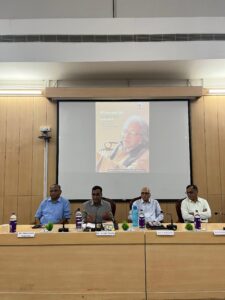
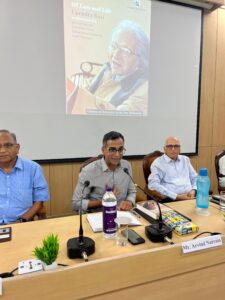
Dr Sitharam’s discussion revolved around Baxi’s book which he described as offering a unique “interlocutory autobiography” of renowned legal scholar Upendra Baxi, capturing the entanglement of his emotional self and reasoned academic outcomes over his 60-year career. He mentioned that this effort is significant in light of India’s lack of comprehensive institutional histories, especially on legal education, which made it challenging to embark on this project. He also quoted historian Ramachandra Guha when he highlighted the difficulty of writing biographies in South Asia due to the blurring of lines between biography and hagiography. He emphasized that such endeavors are crucial for self-reflection, which quoting Foucault he said was considered the very essence of modernity. The conversation underscores the importance of these attempts to understand the development of legal education, culture, and history in a region where source materials are limited.
Justice Ravindra Bhat gave the valedictory remarks. He first discussed the idea of entangling emotions put forward by Albie Sachs. However, he cautioned that emotional and intellectual aspects need to be separated, otherwise it can lead down a path of self-justification. He praised Justice John Stevens for his remarkably lucid writing style, citing his books like “The Making of a Justice: Reflections on My First 94 Years.” Justice Bhat also greatly appreciated that all 6 panel discussions brought out remarkable insights on diverse issues like electoral bonds, federalism, disability rights, etc
The vote of thanks was delivered by Utkarsh Mani Tripathi, Jai Agarwal, and Eeshan Sonak, in gratitude to the university administration, professors and student organizing committee for conducting the program.
Thank you to all attendees, panelists and faculty that made this event a huge success!



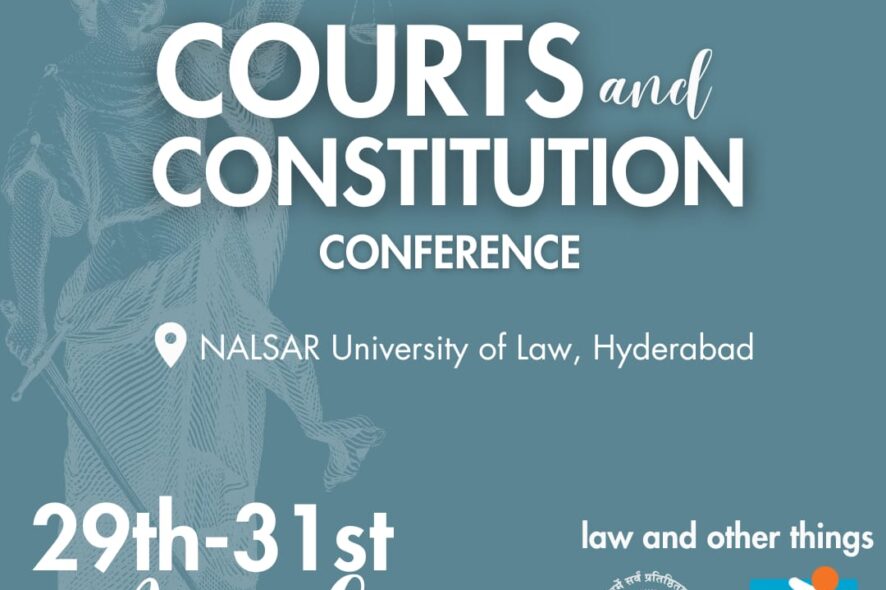




Very well written and explained